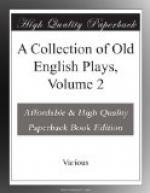([Greek: alpha]) “Barnavel’s Apologie, or Holland’s Mysteria: with marginall Castigations, 1618.” The Apology, originally written in Dutch, had been translated into Latin, and thence into English. The Castigations, by “Robert Houlderus, Minister of the Word of God,” are remarkable, even in the annals of theological controversy, for gross blackguardism. After indulging in the most loathsome displays of foul brutality, this “Minister of the Word of God” ends with the cheerful prayer,—“That they whom Thou hast predestinated to salvation may alwayes have the upper hand and triumph in the certainty of their salvation: but they whom Thou has created unto confusion, and as vessels of Thy just wrath, may tumble and be thrust headlong thither whereto from all eternitie Thou didst predestinate them, even before they had done any good or evil.”
([Greek: beta]) “Newes out of Holland: concerning Barnavelt and his fellow-Prisoners, their Conspiracy against their Native Country with the enemies thereof: The Oration and Propositions made in their behalfe unto the Generall States of the United Provinces at the Hage, by the Ambassadours of the French King,” &c., 1619.
([Greek: gamma]) “The Arraignment of John Van Olden Barnavelt, late Advocate of Holland and West Freisland. Containing the articles alleadged against him and the reasons of his execution,” &c., 1619.
* * * * *
“This magnificent play is mainly the production of Fletcher and Massinger: it must have been written between May, 1619, and May, 1622, for the King’s company acting at Blackfriars. T[homas] Hol[combe] acted a woman’s part in it: so did G. Lowin, perhaps a son of John Lowin, unless indeed G. is a miswriting for J., as sometimes happens. It is singular that one has no knowledge whatever of Thomas Holcombe, except as an actor in Fletcher’s plays: although so many of the lists of the king’s men of that date have come down to us. Mr. Gough who took the part of Leidenberg, is Robert Gough, not Alexander: the latter acted only in Charles I.’s time. Another actor, Michael, is unknown: probably a super.”—F.G. FLEAY.
Since the above paragraph was written, I have found in the MS. the names of three more actors, Jo[hn] Rice, Bir[ch], and T[homas] Po[llard]. The following note, for which I am indebted to Mr. Fleay, will be read with interest:—“It is noticeable that a play called the Jeweller of Amsterdam or the Hague, by John Fletcher, Nathaniel Field, and Phillip Massinger, was entered on the Stationers’ Books 8th April, 1654, but not printed. This play must have been written between 1617 and 1619, while Field was connected with the King’s company, and undoubtedly referred to the murder of John Van Wely, the Jeweller of Amsterdam, by John of Paris, the confidential groom of Prince Maurice, in 1619. It is prima facie likely that the same authors would be employed on both plays. Field, Daborne, Dekker and Fletcher are the only authors known to have written in conjunction with Massinger; and Dekker and Daborne are out of the question for that company at that date. We are now enabled to fix the date of the ‘Fatal Dowry,’ by Field and Massinger, as c. 1618.”




